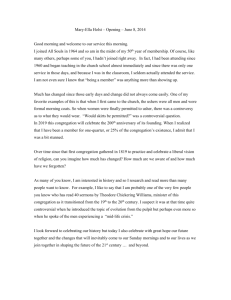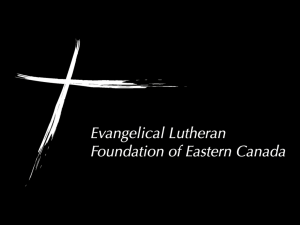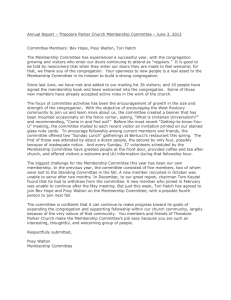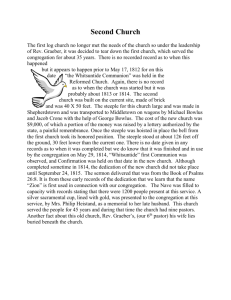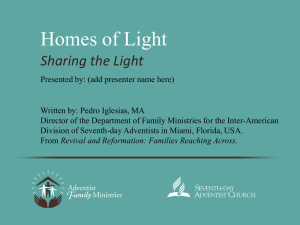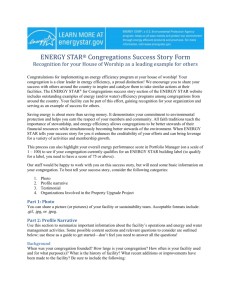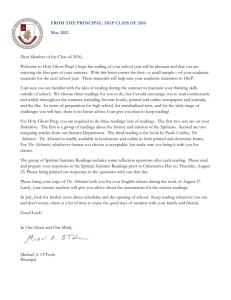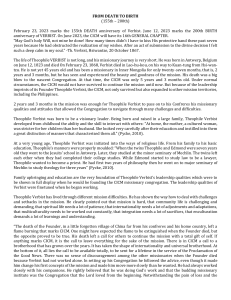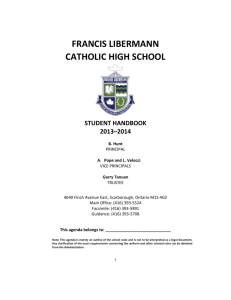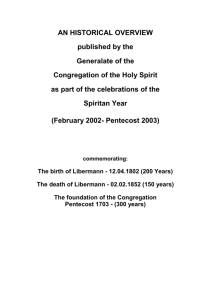During the past year, two thought-provoking presentations were
advertisement
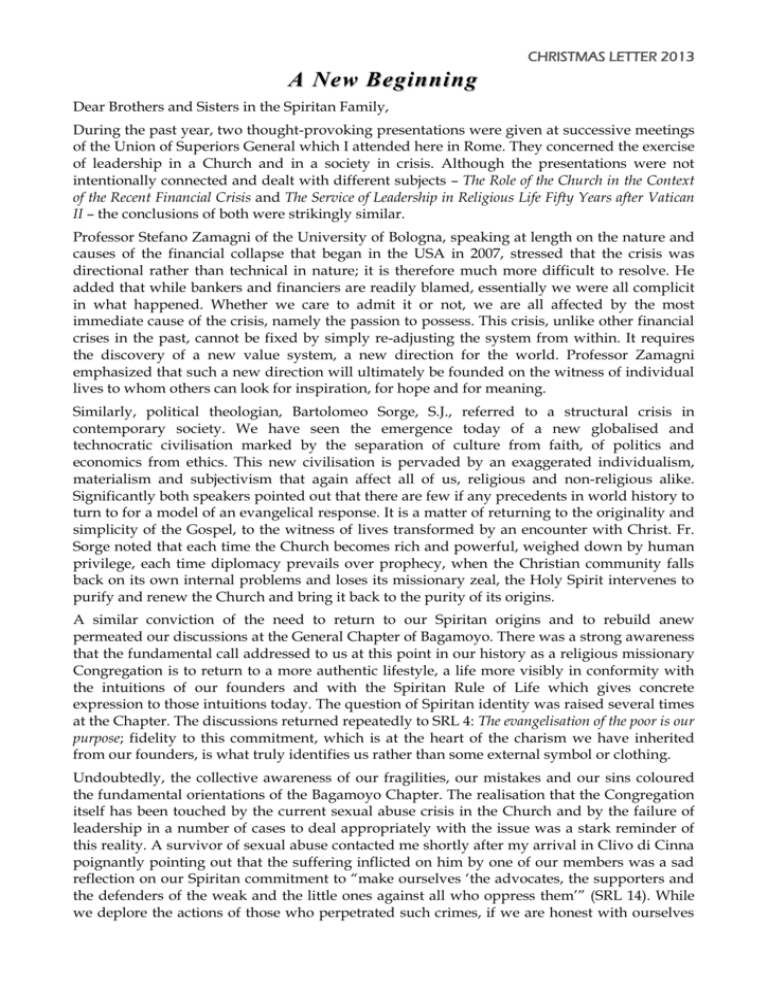
CHRISTMAS LETTER 2013 A New Beginning Dear Brothers and Sisters in the Spiritan Family, During the past year, two thought-provoking presentations were given at successive meetings of the Union of Superiors General which I attended here in Rome. They concerned the exercise of leadership in a Church and in a society in crisis. Although the presentations were not intentionally connected and dealt with different subjects – The Role of the Church in the Context of the Recent Financial Crisis and The Service of Leadership in Religious Life Fifty Years after Vatican II – the conclusions of both were strikingly similar. Professor Stefano Zamagni of the University of Bologna, speaking at length on the nature and causes of the financial collapse that began in the USA in 2007, stressed that the crisis was directional rather than technical in nature; it is therefore much more difficult to resolve. He added that while bankers and financiers are readily blamed, essentially we were all complicit in what happened. Whether we care to admit it or not, we are all affected by the most immediate cause of the crisis, namely the passion to possess. This crisis, unlike other financial crises in the past, cannot be fixed by simply re-adjusting the system from within. It requires the discovery of a new value system, a new direction for the world. Professor Zamagni emphasized that such a new direction will ultimately be founded on the witness of individual lives to whom others can look for inspiration, for hope and for meaning. Similarly, political theologian, Bartolomeo Sorge, S.J., referred to a structural crisis in contemporary society. We have seen the emergence today of a new globalised and technocratic civilisation marked by the separation of culture from faith, of politics and economics from ethics. This new civilisation is pervaded by an exaggerated individualism, materialism and subjectivism that again affect all of us, religious and non-religious alike. Significantly both speakers pointed out that there are few if any precedents in world history to turn to for a model of an evangelical response. It is a matter of returning to the originality and simplicity of the Gospel, to the witness of lives transformed by an encounter with Christ. Fr. Sorge noted that each time the Church becomes rich and powerful, weighed down by human privilege, each time diplomacy prevails over prophecy, when the Christian community falls back on its own internal problems and loses its missionary zeal, the Holy Spirit intervenes to purify and renew the Church and bring it back to the purity of its origins. A similar conviction of the need to return to our Spiritan origins and to rebuild anew permeated our discussions at the General Chapter of Bagamoyo. There was a strong awareness that the fundamental call addressed to us at this point in our history as a religious missionary Congregation is to return to a more authentic lifestyle, a life more visibly in conformity with the intuitions of our founders and with the Spiritan Rule of Life which gives concrete expression to those intuitions today. The question of Spiritan identity was raised several times at the Chapter. The discussions returned repeatedly to SRL 4: The evangelisation of the poor is our purpose; fidelity to this commitment, which is at the heart of the charism we have inherited from our founders, is what truly identifies us rather than some external symbol or clothing. Undoubtedly, the collective awareness of our fragilities, our mistakes and our sins coloured the fundamental orientations of the Bagamoyo Chapter. The realisation that the Congregation itself has been touched by the current sexual abuse crisis in the Church and by the failure of leadership in a number of cases to deal appropriately with the issue was a stark reminder of this reality. A survivor of sexual abuse contacted me shortly after my arrival in Clivo di Cinna poignantly pointing out that the suffering inflicted on him by one of our members was a sad reflection on our Spiritan commitment to “make ourselves ‘the advocates, the supporters and the defenders of the weak and the little ones against all who oppress them’” (SRL 14). While we deplore the actions of those who perpetrated such crimes, if we are honest with ourselves CHRISTMAS LETTER 2013 we will admit that there is a gap in all of our lives between the image we present and the reality we live and each one of us has subtle mechanisms for exploiting others to our own benefit. Transparency, accountability and the willingness to humbly acknowledge our errors are central to the process of renewal in the Congregation. Mission in the contemporary world is above all about the witness of our lives; people are looking for spiritual leadership, for men and women who have found meaning and hope in their own personal lives, men and women of prayer who have discovered God and whose lives have been deeply touched by this experience. The manner in which the simple lifestyle and message of Pope Francis has profoundly affected the lives of so many people is an eloquent testimony to the truth of this assertion. The first phase of our Congregation-wide Animation Plan is precisely a call go back to our beginnings, to allow Poullart des Places and Libermann to reshape our spirituality, our personal and community lives and our missionary commitments today. We need to listen again to our own story, as it began in the lives of our founders and as it unfolded in the inspirational lives of our Spiritan ancestors. We need to rediscover our own personal inspiration in re-reading the stories of the early Spiritan pioneers: Spiritans such as Fr. Allenou, a canon in Quebec who gave everything he owned for the poor and died in the “odour of sanctity” (J. Michel, Claude-François Poullart des Places,, p. 289ff); Bishop Kerhervé of Indo-China, whose episcopal wardrobe consisted of an old cassock and a worn-out pair of shoes (Michel, p. 310); Fr. Maillard, whose secret of success among the Micmac Indians is ascribed to the fact that he identified totally with the lifestyle of the people he served (H. Koren, Knaves or Knights, p. 78ff); Bishop Pottier of China who wrote. “The fewer needs we create for ourselves, the richer we are” (Michel, p. 311); Fr. Lanoë, a missionary in Guyana who stated: “I would like to see us here ‘one heart and one soul’ without that wretched mine and yours’ which causes so many disorders” (Letter of Lanoë to Becquet, Nov. 7, 1884). Each of us can certainly add other more contemporary names of Spiritans who have provided personal inspiration to us on our Spiritan journey and who have helped us to remain faithful to our Spiritan ideals. A pilgrimage into our past will reveal that our beginnings as a Congregation were very humble indeed but that God accomplished wonderful deeds through the lives of simple, committed Spiritans who were aware of their limitations but were open to the power of the Spirit. Reflecting on the founding of the ‘poor little’ Society of the Missionaries of the Holy Heart of Mary, Eugene Tisserant pointed out that, unlike the Jesuits and the Franciscans, we have ‘no remarkable figures or men of great talent; all we have are people of good will, unsure as to how they were brought together …without the ability to put any project together but feeling themselves led by an invisible force who directs them and who removes from their path difficulties which seem truly insurmountable…’(E. Tisserant, L’Oeuvre des Noirs, 13 October 1842, N.D.I, 589-90). We are often concerned about diminishing numbers in the Congregation but Francis Libermann had great confidence in the effectiveness of a small group of people who share the same vision and are totally committed to the same aims (cf. for example, Lettres Spirituelles I, Lettre à un directeur de séminaire, 23 avril 1838, p. 489-490). We will shortly celebrate the feast of Christmas, the astounding fact that the Son of God “pitched his tent among us” and shared the fragility and vulnerability of our human condition. May our mediation on this incredible mystery deepen our awareness of the need for greater simplicity and authenticity in our lives as Spiritans and of our calling to give inspirational witness to our brothers and sisters in a world desperately in search of hope and meaning. John Fogarty, C.S.Sp. Superior General

